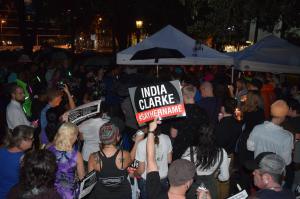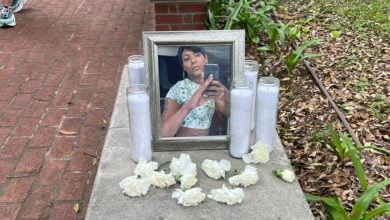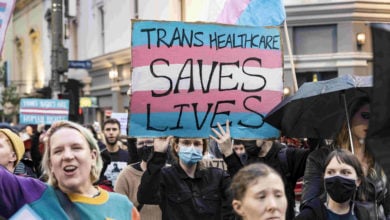On July 24, more than 100 people came out in the rain to attend a vigil in commemoration of India Clarke in Lykes Gaslight Park in Tampa. Clarke, a transgender Black woman, was murdered last week outside University Area Community Center in Tampa. She was the tenth trans woman killed this year in the United States, one day before K.C. Haggard, another trans woman, was killed in Fresno, California.
Clarke was popular and known for being outgoing, confident and happy. About four years ago, she came out as a woman and spoke openly about her identity. She would let others know about the discrimination and harassment she faced and was involved in advocacy for the Black LGBTQ community. Because of discrimination, Clarke had trouble finding work but planned on going back to cosmetology school.
Trans issues have come into the mainstream recently, especially thanks to high-profile trans celebrities such as Caitlyn Jenner and Orange Is the New Black star Laverne Cox. In fact, Laverne Cox and writer/trans activist Janet Mock helped raise awareness about Clarke’s death last week. But trans oppression, especially violence against trans women of color, remains one of the most staggering social crises in the United States.
Liberation News spoke to members of the local trans community about their experiences and the importance of standing up for trans rights.
“When I learned that we lost another part of our community because of violence, obviously I was very saddened, angered and outraged. But I also encountered a lot of negativity as far as the way the media was reporting and covering this. They were using a lot of inappropriate terms and pronouns, they were trying to shame her because she was involved in sex work and past arrests. That also put me into a state of intense anger,” said Gianna Love, a local trans activist who organized Saturday’s vigil.
“I think that people should realize that there are no cookie cutter identities that can adequately express human experience. Everyone’s gender is nuanced, unique and different. People should really acknowledge that,” she said. “They should be compassionate and have a more open mindset as far as it concerns gender identity and sexuality. Especially with people who are openly living in identities that are not widely accepted by mainstream society.”
Apple Love, Gianna’s trans mother, told Liberation why she came to the protest and what Clarke’s death meant to her.
“I came out to support the movement, get some things changed, get some laws changed, get some attitudes changed in the world relating to the trans community. To get a more positive outlook and education out there so that people realize we’re just people like everyone else, we bleed just like everyone else,” said Love. “India’s death opens our eyes and it makes me realize how very precious life is, and how quickly it’s taken away just because I’m different. That needs to change.”
Liberation also spoke to Riley Alexander. He talked about how Clarke’s death resonated with his experiences in Tampa.
“I live with that fear and ambivalence every day and I can never go out in a public setting without being fearful,” said Alexander. “I know that it’s something that I’m going to have to deal with and I’m going to have to keep pushing forward. It’s something I’m going to do for myself. But it is definitely very trying, every single day. The looks get harder and harder sometimes, but I know I have the pride in myself to keep going.
“When somebody can’t identify your gender when they see you, they kinda get scared and they don’t know how to handle you. And it’s really weird, because I’m another human being. Just handle me the same way you would handle anybody else. I’ve been denied service at some places, I’ve had some harassment, I’ve had physical attacks and that’s one of the reasons I came out here,” said Alexander.
Jake Haywood from Sarasota told Liberation what he believes could help end anti-trans violence and discrimination.
“I think we need to incorporate trans into every day life,” said Jake. “For example, the cartoon Steven Universe has two female-presenting, technically non-binary characters who kiss each other’s faces and are in a romantic relationship. We need to show things like that in children’s programming so that people grow up with it and get used to it. Also, politically, most people in power right now are older, with worldviews that are outdated. We need more people who, instead of just saying ‘I support the gays’ like Obama is right now, actually make more moves to integrate trans issues.”
Liberation also spoke to Elliot, an activist living in Sarasota who has been involved in Black Lives Matter, Occupy and organizing against mountaintop removal in Appalachia.
“I came out tonight because I think it’s important to show visible and public support for trans people and trans women of color specifically,” said Elliot. “I think that specifically being a Black trans woman, you’re at the center of so many nodes of oppression. Not only has Black femininity been devalued like no other group in this country, you’re also dealing with the fact that you are a trans woman.
“Fighting against police brutality is one way we can help specifically Black trans people,” they said. “Also, addressing poverty, because Black people are so much more likely to face poverty because of the systemic racism in this country. We need to be working on providing resources for alleviating poverty, alleviating homelessness, alleviating all these issues that—because of systemic oppression—affect Black trans people and Black trans women more than your average population or people with only some of those identities.”







